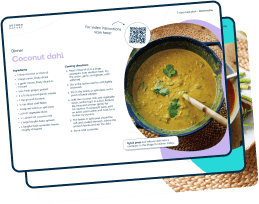Emotional eating occurs when food soothes or suppresses negative emotions such as isolation, anger, boredom, or stress. Often comfort or emotional eating ignores feelings of physical hunger that come from an empty stomach.
Essentially, emotional eating is a physical response to an unmet psychological need.
Consciously and unconsciously, we connect feelings with food. This is why it’s so important to think about how and why we eat, rather than just what we eat.
The most common foods craved are usually highly processed, such as biscuits, crisps, chocolate, and ice cream. These foods are scientifically engineered to quickly target the pleasure receptors in our brains.
Many people experience emotional eating at one time or another. However, when emotional eating happens frequently, and food becomes the primary coping mechanism for a stressful situation, it can affect both our health and mental well-being.
Interestingly, research suggests that women may be more likely to use food as a coping mechanism compared to men, who may be more likely to turn to alcohol or smoking. As a result, weight gain and obesity were found to be related to stress eating in women, but not in men.
It’s also important to distinguish between emotional eating and binge eating disorder (BED), which is a severe mental illness.
Overeating every now and again is perfectly normal, however, if you’re experiencing binge eating episodes at least once a week for three months, it’s important to seek help from a qualified healthcare professional.
Key points:
- Emotional eating happens when we use food as a coping mechanism to soothe or suppress particular emotions
- The foods that we’re most likely to seek out when upset are those that quickly target the pleasure receptors in our brain, like cake, crisps, and chocolate
- Research suggests that women may be more likely to experience emotional eating compared to men.
Medication-assisted weight loss with a future focus
Start with Wegovy or Mounjaro, transition to habit-based health with our support


Why do we crave certain foods when upset or stressed?
The biological response
All too often we blame ourselves for giving in to cravings associated with certain emotions, like stress or anxiety. However, there’s actually a scientific explanation that has nothing to do with willpower.
When we’re exposed to a sudden threat, either physically or mentally, our body engages the ‘fight or flight’ response.
This causes the release of a hormone known as ‘cortisol’ which is commonly referred to as the ‘stress hormone’. Cortisol then triggers a cascade of events in the body, including increased blood pressure, pulse rate, breathing rate, and blood flow to the muscles.
If we suddenly need to run from a predator, as our ancestors did hundreds of years ago, this response is very useful.
However, nowadays, small daily life stressors tend to trigger the full ‘flight or fight’ response, which results in a state of chronic stress and consistently high levels of circulating cortisol.
The role of cortisol in emotional eating
Cortisol can impact our food choices in a number of ways. Firstly, elevated levels of cortisol can result in increased appetite and a greater motivation to eat. This is because the body gets tricked into thinking it’s constantly in a state of ‘fight or flight’.
It drives our desire to obtain energy quickly, so we can fuel our body to prepare for action. However, if we don’t end up using this additional energy, we store the excess as fat, which results in weight gain in the long term.
Scientific studies have observed that people with higher cortisol levels were more likely to snack throughout the day, eat more food overall, and have higher BMI compared to those with lower cortisol levels.
Interestingly, research has also found that cortisol may increase the storage of visceral fat, which is the fat that lives under the muscle in our abdomen (a.k.a. stomach fat). Visceral fat is believed to be more dangerous to our health compared to peripheral fat, because it sits around our organs.
Key points:
- When we experience a stressful situation, our brain signals for the release of the stress hormone cortisol
- This response has been essential to human survival throughout evolution, however, nowadays small daily life stressors can trigger the full stress response and cause consistently high cortisol levels
- High cortisol levels can result in an increased appetite, increased motivation to eat, and weight gain.
How emotional eating becomes a habit
Alongside the impacts of cortisol on our appetite and food intake, other pathways are laid down in the brain that can reinforce emotional eating behaviours. This means that over time, emotional eating becomes a habit that we do automatically in response to a particular emotion.
One of the key neurotransmitters (chemical messengers) involved in laying down this habit pathway is dopamine, which is directly involved in triggering feelings of euphoria, bliss, motivation, and pleasure.
Certain foods have been shown to encourage dopamine signalling in the brain, in particular, those foods that have been engineered to have the perfect combination of fat, salt, and sugar, like cakes, crisps, chocolate, cakes, and ice cream.
These foods can trick our body into ignoring feelings of satiety or fullness, meaning they’re very hard to stop eating once we’ve started.
The release of dopamine as a result of eating these foods triggers a strong feeling of pleasure, which acts like a high and can become addictive.
Understandably, when we’re feeling upset or low, we seek out those feelings of pleasure, which our brain has learnt to associate with these foods.
In a TED talk on the topic, psychiatrist Judson Brewer points out that this cycle is built upon context-dependent memory.
Our brain remembers what actions make us feel good, such as eating chocolate. Then when we feel bad for whatever reason, our brain says ‘eating chocolate might help’, and we’re driven to eat chocolate. After we repeat this process enough, it becomes an automatic habit.
Key points:
- Habit pathways laid down in our brain can lead to automatic emotional eating behaviours
- Certain foods (like cakes, crisps, chocolate, and ice cream) trigger a larger dopamine response in the brain, which leads to heightened feelings of pleasure and euphoria
- When we’re feeling upset or low, our brain seeks out these feelings of pleasure, which it knows it can get by eating certain foods
- As we repeat this behaviour over time, turning to these foods when we’re feeling distressed or upset becomes an automatic behaviour
How to overcome emotional eating
It takes a long time for our brain to lay down the habit pathway associated with emotional eating, so understandably it will take us time and practice to undo this.
Take a look at our guides on ‘identifying emotional eating’ and ‘overcoming emotional eating’ if you think you might be experiencing emotional eating and would like some techniques to help overcome it.
If you‘re looking for extra support in helping you manage emotional eating, you might consider joining an online programme. Digital programmes offer the convenience of being able to engage with it from our homes, rather than travelling to a meeting or group.
Second Nature is a 12-week digital habit change programme that focuses heavily on our mindset in relation to weight loss and food choices. Whilst on the programme, you’ll have daily support from a qualified nutritionist or dietitian who can help you develop effective strategies to overcome emotional eating.
When you sign up to the programme, you’ll also be provided with a peer support group of other people who’re starting the journey at the same time as you. Many people find the combination of advice from their health coach and social support from their peer group extremely motivating.
Take home message
- Emotional eating occurs when food is used to soothe or suppress negative emotions such as isolation, anger, boredom, or stress
- Most people will experience emotional eating from time to time, however, when it becomes the primary coping mechanism for dealing with stressful situations, our mental and physical wellbeing can be impacted
- When we become stressed or anxious on a regular basis, our body can have a higher level of circulating cortisol, which is known as the ‘stress hormone’
- High levels of cortisol have been linked to increased appetite, a greater motivation to eat, weight gain, and a higher BMI
- We’re also more likely to crave certain foods when stressed, which are usually highly processed, such as biscuits, crisps, chocolate, and ice cream
- These foods are scientifically engineered to quickly target the pleasure receptors in our brains, which can lead to feelings of pleasure and euphoria
- Over time, the brain learns to seek out these foods that stimulate pleasure in response to negative feelings, which can turn emotional eating into a habit
- This habit pathway can take a long time to lay down in the brain, so it’s important to have patience and understanding with ourselves when learning to overcome emotional eating.


